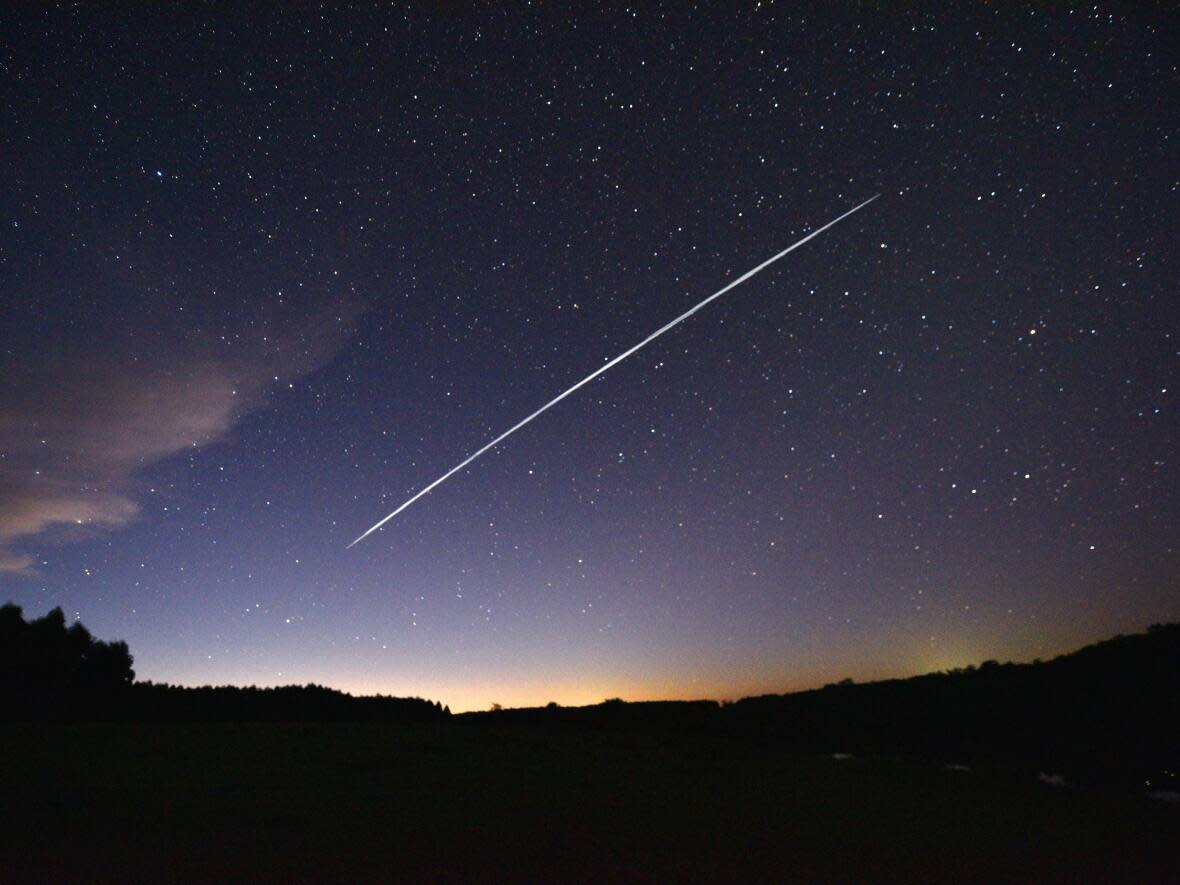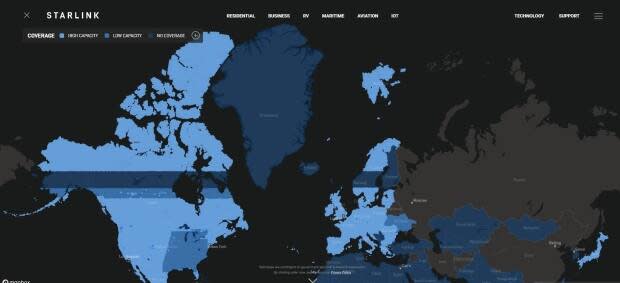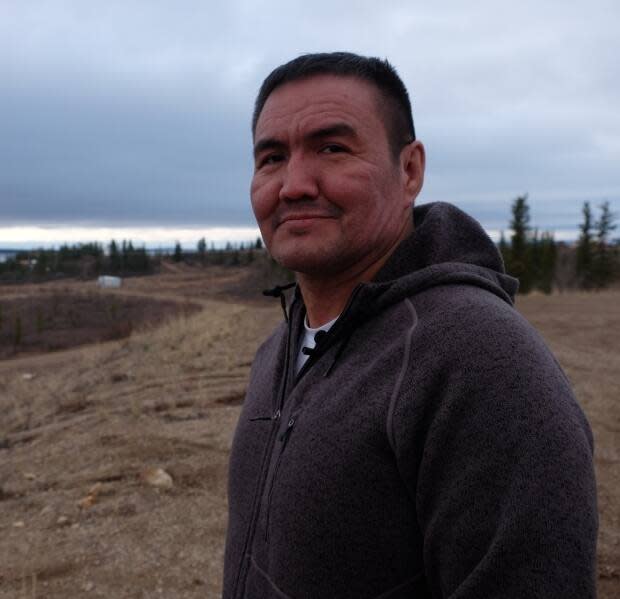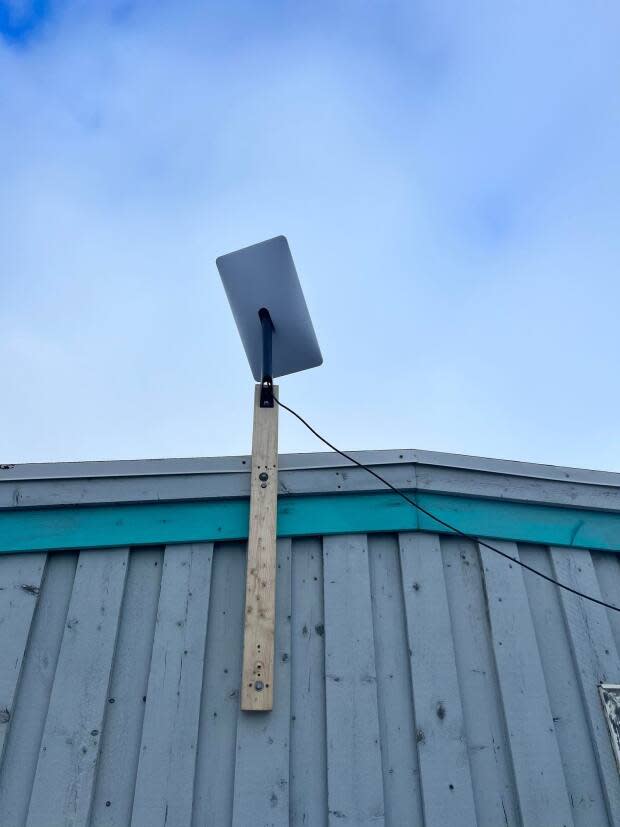Elon Musk's Starlink high-speed satellite internet service begins northern rollout

High-speed internet could be available everywhere in the North, to anyone with a Starlink satellite dish, as early as the first quarter of 2023.
Indeed for some early adopters, Elon Musk's satellite internet service has already arrived.
This week early purchasers of Starlink's "RV" internet in Iqaluit reported that their dishes were picking up a signal. People who ordered Starlink's residential package in Nunavut and Northwest Territories recently got emails indicating their orders were being processed.
Vincent Yvon Ortega Leon runs a food delivery business in Iqaluit. Slow internet and data caps have been a problem for him.
He signed up for Starlink's pricier RV internet, and about a month ago, his dish arrived. Two weeks ago, he said, he was out for a dog walk and saw his dish moving around.
He was online.
"It changed a lot," he said, noting he can watch Netflix in high definition, game and video conference, and doesn't have to worry about data limits.
"You just go online like everyone is doing in Canada," he said. "That is the very good, important thing."
Starlink satellite internet is operated by Elon Musk's spacecraft and rocket launch company, SpaceX.
It promises to bring faster speeds, and unlimited data, directly to users in rural and remote areas at monthly prices comparable to some existing internet packages in the territories.
The company plans to do this through a network of thousands of low-Earth orbit satellites, which allow for faster connection speeds to users on the ground.
SpaceX can create such a vast network because it can launch its own satellites.
According to a map on Starlink's website, the company recently expanded coverage to the far north, Yellowknife, Rankin Inlet and Iqaluit. The map says Starlink expects to fully cover three territories and Alaska in the first months of 2023.

Kirby Marshall, CEO of Global Storm IT Corporation, which is headquartered in Yellowknife, called the arrival of low-Earth orbit satellite internet in the North "revolutionary."
"You can be in the bush and you will have internet speeds such that you'll be able to do any and all of the things that you want to do, whether it's live streaming, social media, email, surfing, what have you," he said.
Marshall said another low-Earth orbit satellite internet network will also soon serve the North: London, England-based company, OneWeb.
Unlike Starlink, which offers set-up-yourself internet directly to at-home users, OneWeb takes more expertise to install, and is aimed at governments, larger businesses and re-sellers, like Global Storm.
Between OneWeb and Starlink, said Marshall, "every square inch of the Northwest Territories, Nunavut, Yukon and Alaska is going to be able to have access to very fast, quite inexpensive internet."
'A lot of people ... will be switching to Starlink'
Paul Brunet, owner of Great White North Technology Consulting, lives in Timmins, Ont., and has clients in Iqaluit and Rankin Inlet.
Brunet has been using Starlink himself and says download speeds are on par with traditional cable home internet in his area. Plus, there's no cap on data right now, which is "extremely useful, especially if you're multiple people in a residence doing Zoom calls and Teams calls and online learning and … streaming," he said.
"I think that there's going to be a lot of people that will be switching over to Starlink."
David Codzi lives in Colville Lake, N.W.T., which relies on internet from a geostationary satellite orbiting much further away.
The maximum home internet package available in his community, through Northern internet service provider Northwestel, offers 60 GB (gigabytes) of data and download speeds of up to 5 Mbps (megabits-per-second), at a cost of $79.95 a month.
To put this in perspective, Northwestel users in Inuvik, N.W.T., can get unlimited data and up to 100 Mbps download speeds for $149.95 per month.
Starlink is offering users in Inuvik 50-to-200 Mbps and unlimited data for $140 a month.

Codzi says that between him and his kids, he burns through his 60 GB of monthly data in mere days.
A couple years ago, Codzi put down a deposit on a Starlink satellite dish. Recently, the company told him he could complete his order.
Now, Codzi plans to cancel his satellite TV and Northwestel internet package, which comes with a landline telephone he has to pay for but doesn't use.
"I just want to get rid of a lot of different things I don't have to pay for," he said.
Codzi believes competition for Northwestel in Colville Lake will benefit consumers, but he cautions that Starlink won't be the best option for everyone.
The up-front cost of the dish — $759 — is out of reach for many people, and lots of homes are already outfitted with a Northwestel internet connection.
He also pointed out that Northwestel is changing how it brings satellite internet into Colville Lake.
Northwestel says it plans to start serving that community, and eight others in N.W.T., with low-earth orbit satellite internet from OneWeb and Telesat next year.
But what that internet will look like for residential users is unclear.
Northwestel declined an interview. When asked over email whether it will offer unlimited data to satellite internet communities once they start using OneWeb's network, a spokesperson responded that the company will announce "future internet plans as they become available."
Fiber 'the best internet network technology,' says Northwestel
For its part, Northwestel maintains that fibre is "the best internet network technology."
Northwestel said that through fibre, it offers home internet with unlimited data and up to 500 Mbps download speeds to 13 N.W.T communities, as well as several communities in the Yukon. Five additional N.W.T. communities are expected to get hooked up to fibre by the end of next year.
The company also said it's asked the CRTC for "a more flexible approach to internet plans so that we can more flexibly provide lower prices and faster speeds to customers."
The CRTC did not respond to CBC's request for an interview.

Some questions remain about Starlink's service in the North: will the company eventually impose data limits? The company says its dishes work down to –30 C, so how well will they fare in Arctic weather?
Starlink doesn't have easy-to-find contact information. A call to Starlink's media line was answered with an automated message directing callers to send an email. Starlink didn't respond to CBC's email or tweet requesting an interview.
Marcus Pine began using Starlink's RV internet in Iqaluit this week. He said he's already been gaming with friends and streaming TV in HD.
But he too said it seems nearly impossible to speak with an actual human being at the company.
Still, for Pine, this inconvenience doesn't outweigh the benefits of better internet.
"It's a huge game changer," he said of the service. "It basically just opens the door to the North."


